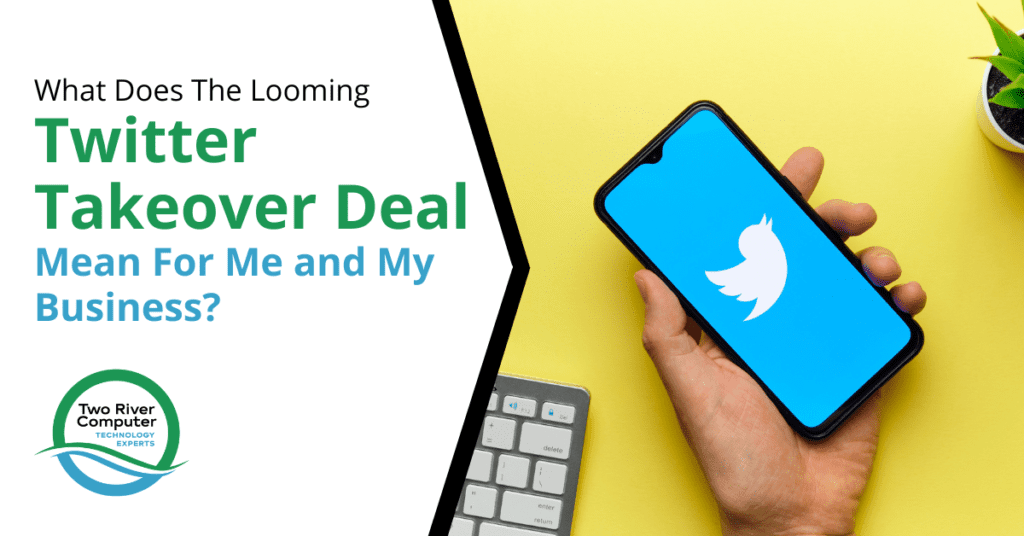
News just in! Despite Elon Musk’s ongoing attempts to back out of his deal to purchase the social media giant, Twitter, an overwhelming number of the company’s shareholders have voted in favor of the takeover.
Musk, of course, is the high-profile founder of brands like Tesla and SpaceX. In April of this year, the media was awash with headlines about his accepted offer to buy Twitter for a huge $44 billion.
While you might not think this news impacts you personally, the role social media plays in all of our lives is undoubtedly huge. In 2022, over half of the global population will use platforms like Facebook, Instagram and Twitter. In fact, the typical person spends over 2 hours on these applications each day!
For businesses, too, Twitter is one of the most authoritative and popular social platforms, perhaps only eclipsed by LinkedIn. It’s estimated that 83% of CEOs and business leaders regularly use Twitter. It can be a great place to share thought leadership, company news and engage with customers.
Moreover, we can’t forget that, for many of us, our phones are equivalent to an extra limb! Whether to access email, chat with friends or browse social media, our phones – and the social media applications on them – are always in our pockets.
All of this is to say that social media is an extremely influential force in our lives. So, when it comes to a single individual buying Twitter – one with a lot of money and a lot of power – should you be worried? And could your business face consequences?
Let’s take a look.
What’s the Latest In The Musk/Twitter Story?
Initially, Musk’s deal to purchase Twitter was all smooth sailing. However, in July, Musk sent a formal letter to Twitter, requesting to terminate the deal because he believed Twitter had lied about the number of spam and fake bot accounts on the platform.
Twitter was having none of this and sued Musk to continue with the deal, alleging that he was in fact getting cold feet about acquisition and using bots as a cover up.
Despite this controversy and several attempts from Musk to terminate the deal, right now it looks like it plans to go ahead.
If it does, we can expect a few changes to the platform under Musk’s control. Note, nothing has been formally cemented yet, but Musk has shared a few high-level plans in interviews, including:
A War On Spam Bots
Spambots are one of the primary causes of social media information. These fraudulent, automated accounts are designed to generate fake, negative news with the goal of driving controversy and pushing certain opinions.
Musk has spoken candidly about reducing the number of spambots on the platform. This would be a good thing, of course, as it would reduce misinformation. However, there are concerns about how this could be achieved without impacting user privacy, which brings us onto our next point.
Authenticating Every User
As it stands, social media platforms offer users a lot of anonymity. You can set up an account as whoever you want to be – you don’t even need to use your real name!
To combat spambots, though, Elon wants to change things. He plans to bring in a Twitter verification mechanism that authenticates individuals to check they’re legitimate.
This has created a lot of concern around personal privacy. The more data Twitter has about individuals, the more risks there are surrounding data leakage and data theft.
For example, if a hacker managed to break into Twitter once the verification mechanism is in place, they could get their hands on a wealth of personal data that could then be used for fraud and targeted cyber-attacks.
Changing The Feed Algorithm To Open Source
In a positive move, Musk has also mentioned plans to make the algorithm that dictates the content people see on their news feeds, open source. This would enable anyone to gain a better understanding of how the algorithm works, how it will change direct marketing, and why it’s chosen to show them particular pieces of content.
There’s been a lot of debate about algorithms as of late, with people suspicious that platforms like Facebook and Instagram prioritize controversial posts that are damaging to people’s mental health and overall wellbeing.
By making the algorithm on Twitter open source, Musk would improve trust and transparency in the platform – which is definitely no bad thing!


